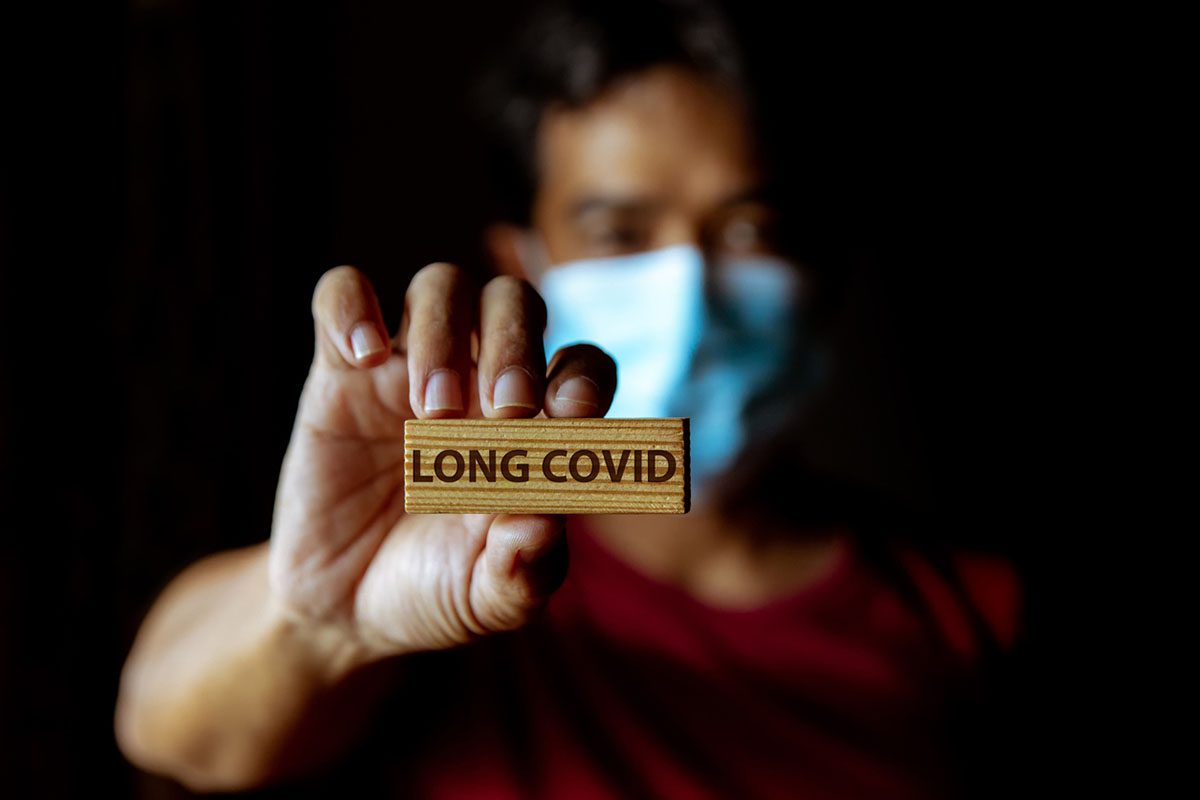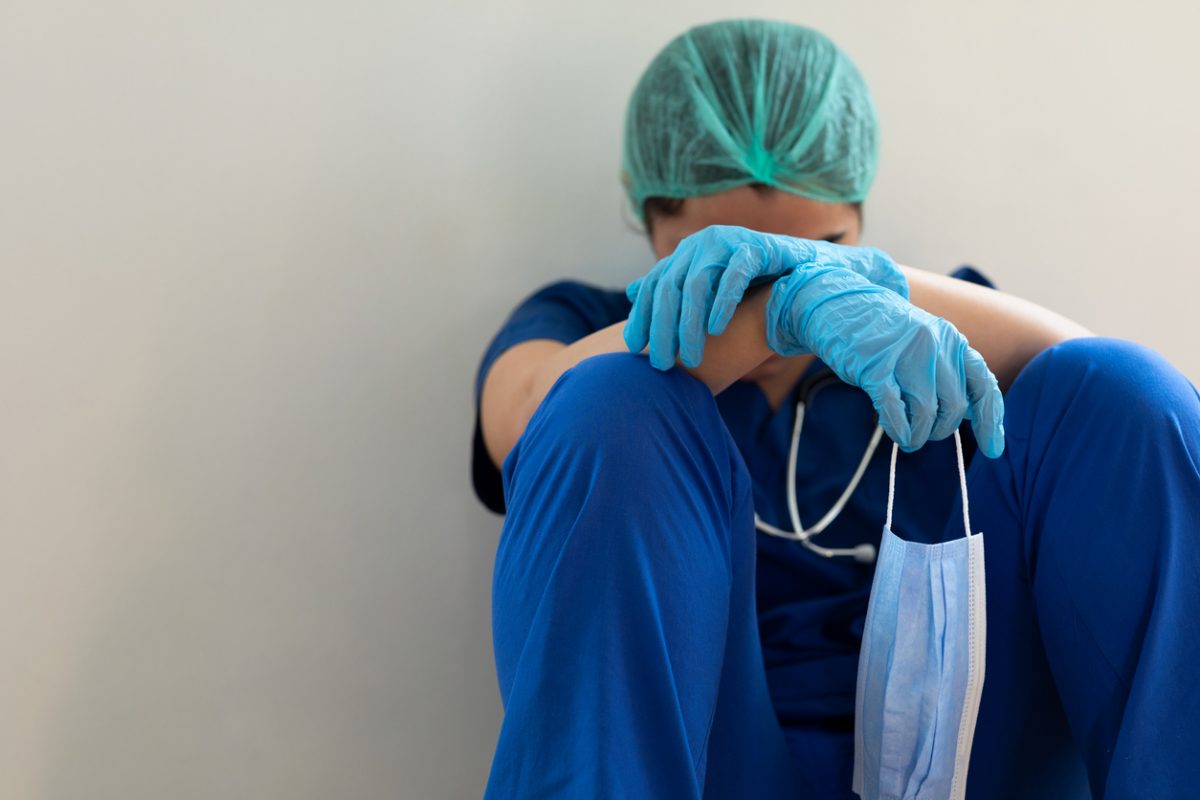See letter by Modesto-Lowe et al, brief report by Pietrzak et al, reply by Sim and Chew, and article by Chew et al
J Clin Psychiatry 2021;82(5):21lr14035b
To cite: Peccoralo L, Depierro J, Feingold JH, et al. Building resilience and well-being in health care workers in the COVID-19 era: lessons learned and next steps—reply to Modesto-Lowe et al. J Clin Psychiatry. 2021;82(5):21lr14035b.
To share: https://doi.org/10.4088/JCP.21lr14035b
© Copyright 2021 Physicians Postgraduate Press, Inc.
aOffice of Well-Being and Resilience, Icahn School of Medicine at Mount Sinai, New York, New York
bDepartment of Medical Education, Icahn School of Medicine at Mount Sinai, New York, New York
cDepartment of Medicine, Icahn School of Medicine at Mount Sinai, New York, New York
dCenter for Stress, Resilience, and Personal Growth, Icahn School of Medicine at Mount Sinai, New York, New York
eDepartment of Psychiatry, Icahn School of Medicine at Mount Sinai, New York, New York
fDepartment of Pharmacology, Icahn School of Medicine at Mount Sinai, New York, New York
gDepartment of Neuroscience, Icahn School of Medicine at Mount Sinai, New York, New York
hDepartment of Psychiatry, Yale School of Medicine, New York, New York
iUS Department of Veterans Affairs National Center for Posttraumatic Stress Disorder, VA Connecticut Healthcare System, West Haven, Connecticut
jDepartment of Social and Behavioral Sciences, Yale School of Public Health, New Haven, Connecticut
*Corresponding author: Robert H. Pietrzak, PhD, MPH, Yale University School of Medicine, National Center for PTSD, 950 Campbell Ave, West Haven, CT 06516 ([email protected]).
To the Editor: We would like to thank Modesto-Lowe and colleagues1 for their thoughtful commentary about our study of factors associated with psychological resilience in health care workers (HCWs) on the frontlines of the COVID-19 pandemic.2 While we cannot definitively conclude from our initial results that bolstering these factors will help improve resilience, results of this study have been instrumental to informing our development of targeted interventions aimed at enhancing resilience and mitigating adverse mental health effects in frontline HCWs at Mount Sinai Hospital.
Toward this end, our team has implemented several strategies aimed at enhancing the resilience and well-being of our HCWs. Some of these strategies focus on enhancing institutional culture, while others focus on the individual. A growing body of research suggests that high-quality, clear, and regular communication from leadership, team-building efforts, and respect for autonomy may help enhance the resilience of HCWs.3 Similarly, results of our study2 revealed that greater perceived leadership support was one of the strongest correlates of resilience during the first COVID-19 pandemic surge in New York City. Further, a study of more than 2,800 physicians conducted prior to the pandemic4 observed a strong relationship between ratings of leader effectiveness and burnout and professional satisfaction. Specifically, every 1-point increase in composite ratings of leader effectiveness was associated with a 9.0% increased likelihood of professional satisfaction and 3.3% reduced risk of burnout.
On the basis of these and internal data, we developed a leadership curriculum for health care leaders that focuses on enhancing coaching and appreciation skills, with the ultimate goal of enhancing resilience, well-being, and professional satisfaction in the workforce. These sessions include a review of communication tools such as Humble Inquiry (ie, asking instead of telling to develop better communication and collaboration)5 and the GROW model of coaching (ie, Goal, Reality, Options, Will),6 as well as the opportunity to practice these skills in small groups. This curriculum was delivered virtually over 2 hours at 2 time points during the pandemic to nearly 150 clinical and research leaders at Mount Sinai, with the goal of bolstering leadership support for our HCWs. Preliminary results revealed that the course was well-received and improved self-reported knowledge and skills in leadership competencies. Initial post-workshop survey results demonstrated that the workshop increased participants’ knowledge or skills in coaching (92%) and appreciation of employees (96%), and 88% felt that their peers would benefit from attending. We are currently analyzing pre- and post-course data and planning a 6-month follow-up assessment.
In addition to institution-focused interventions, there is some meta-analytic evidence7 suggesting that individual-focused resilience interventions may help bolster resilience and mitigate stress in HCWs (standardized mean difference [SMD] for measures of resilience = 0.45; 95% CI, 0.25 to 0.65; SMD for measures of stress = −0.61; 95% CI, −1.07 to −0.15; SMD for measures of depressive symptoms = −0.29; 95% CI, −0.50 to −0.09). These findings parallel those reported in a meta-analysis of controlled trials of resilience interventions8 conducted in a broad range of trauma survivors, which found a small-to-moderate improvement on measures of resilience (pooled SMD = 0.44; 95% CI, 0.23 to 0.64). However, concerns remain about the quality of study designs used to evaluate such interventions,7 as well as a lack of an evidence base to inform the selection and implementation of such interventions in frontline HCWs during and after disease epidemics,9 warranting continued research in this area.
At Mount Sinai, we are also engaged in system-wide efforts to implement and evaluate individual and group-level interventions to promote resilience in HCWs. Early in the pandemic, the Mount Sinai Health System founded the Center for Stress, Resilience and Personal Growth (CSRPG) to support the resilience and mental well-being of its entire workforce.10 A cornerstone of CSRPG offerings consists of resilience workshops, which focus on 5 domains: (1) self-care; (2) facing fears; (3) realistic optimism; (4) social support; and (5) meaning, faith, and spirituality. These domains are based on the work of Steven Southwick, MD, and Dennis Charney, MD, who have comprehensively reviewed evidence-based factors associated with resilience in individuals affected by stress and trauma11 and how they apply to COVID-19 HCWs.12 Through a combination of in-person and virtual offerings, 100 workshops have been completed between June 2020 and April 2021. Workshop content is now being made available in a mobile app that employees can utilize at their own pace, particularly if they are not able to attend workshops.13 Several research studies are ongoing to evaluate the effectiveness of these group and self-guided resilience trainings in mitigating distress and bolstering resilience.
While the health care community has made some advances in resilience training, there is much work to do in developing sustainable resilience-building programs and identifying novel and creative ways to measure the impact of such interventions in HCWs. Digital platforms may provide opportunities to extend the reach of interventions and, together with wireless physiologic monitoring, have shown promise in providing real-time data capture in this population.14
When evaluating resilience interventions for HCWs, it is also important to consider preexisting mental health difficulties. For example, our research group observed a strong association between pre-pandemic burnout and higher rates of depressive, anxiety, and pandemic-related posttraumatic stress disorder symptoms in COVID-19 frontline HCWs.15 This finding suggests that organizational efforts to address burnout and related mental health issues on an ongoing basis may help prevent adverse mental health consequences during times of crisis and create a more resilient health care workforce and organization. Further, resilience training that is delivered prior to crisis situations may help prepare HCWs for the emotional challenges that these situations present.16 Finally, in addition to adverse outcomes, it is possible that the COVID-19 pandemic experience will give rise to posttraumatic growth, which may in turn help to promote individual and organizational resilience to subsequent crises.17 Given the countless sacrifices that health care personnel make every day, particularly during the COVID-19 pandemic, continued efforts to develop, evaluate, and disseminate resilience-building interventions are critical to bolstering and maintaining the emotional well-being of this dedicated population.
Published online: July 27, 2021.
Potential conflicts of interest: Dr Feder is named co-inventor on an issued patent in the United States, and several issued patents outside the United States, filed by the Icahn School of Medicine at Mount Sinai (ISMMS) for the use of ketamine as a therapy for posttraumatic stress disorder (PTSD). This intellectual property has not been licensed. Drs Charney and Feder are named co-inventors on an issued patent in the United States, and several issued patents outside the United States, filed by ISMMS for the use of ketamine as a therapy for PTSD. This intellectual property has not been licensed. In addition, Dr Charney is named co-inventor on several issued US patents, and several pending US patent applications, filed by ISMMS for the use of ketamine as a therapy for treatment-resistant depression and suicidal ideation and other disorders. ISMMS has entered into a licensing agreement with Janssen Pharmaceuticals, Inc., and it has and will receive payments from Janssen under the license agreement related to these patents for the treatment of treatment-resistant depression and suicidal ideation. Consistent with the ISMMS Faculty Handbook (the medical school policy), Dr Charney is entitled to a portion of the payments received by the ISMMS. Since SPRAVATO has received regulatory approval for treatment-resistant depression, ISMMS and thus, through the ISMMS, Dr Charney, will be entitled to additional payments, beyond those already received, under the license agreement. Dr Charney is a named co-inventor on several patents filed by ISMMS for a cognitive training intervention to treat depression and related psychiatric disorders. The ISMMS has entered into a licensing agreement with Click Therapeutics, Inc., and has and will receive payments related to the use of this cognitive training intervention for the treatment of psychiatric disorders. In accordance with the ISMMS Faculty Handbook, Dr Charney has received a portion of these payments and is entitled to a portion of any additional payments that the medical school might receive from this license with Click Therapeutics. Dr Charney is a named co-inventor on a patent application filed by the ISMMS for the use of intranasally administered Neuropeptide Y (NPY) for the treatment of mood and anxiety disorders. This intellectual property has not been licensed. Dr. Charney is a named co- inventor on a patent application in the United States, and several issued patents outside the United States filed by the ISMMS related to the use of ketamine for the treatment of PTSD. This intellectual property has not been licensed. Dr Southwick receives royalties from Cambridge University Press for the book, Resilience: The Science of Mastering Life’s Greatest Challenges (2018). Dr Pietrzak is a paid consultant to The Office of Well-Being and Resilience at Icahn School of Medicine at Mount Sinai. Drs Peccoralo, Depierro, and Ripp and Ms Feingold have no conflicts to disclose.
Funding/support: Preparation of this letter was supported by internal funding devoted to COVID-19-related projects from the Icahn School of Medicine at Mount Sinai.
Role of the sponsor: The Icahn School of Medicine at Mount Sinai had no role in the preparation of this letter.
References (17)

- Modesto-Lowe V, LaBell JC, Meyers NZ. Can you teach resilience? J Clin Psychiatry. 2021;82(5):21lr14035.
- Pietrzak RH, Feingold JH, Feder A, et al. Psychological resilience in frontline health care workers during the acute phase of the COVID-19 pandemic in New York City. J Clin Psychiatry. 2020;82(1):20l13749. PubMed CrossRef
- Rieckert A, Schuit E, Bleijenberg N, et al. How can we build and maintain the resilience of our health care professionals during COVID-19? Recommendations based on a scoping review. BMJ Open. 2021;11(1):e043718. PubMed CrossRef
- Shanafelt TD, Gorringe G, Menaker R, et al. Impact of organizational leadership on physician burnout and satisfaction. Mayo Clin Proc. 2015;90(4):432–440. PubMed CrossRef
- Whitmore J. Coaching for performance: the principles and practice of coaching and leadership. 5th ed. London, UK: Nicolas Brealey Publishing; 2017.
- Schein EH, Schein PA. Humble inquiry: the gentle art of asking instead of telling. Oakland, CA: Berrett-Koehler Publishers; 2021.
- Kunzler AM, Helmreich I, Chmitorz A, et al. Psychological interventions to foster resilience in healthcare professionals. Cochrane Database Syst Rev. 2020;7:CD012527. PubMed
- Joyce S, Shand F, Tighe J, et al. Road to resilience: a systematic review and meta-analysis of resilience training programmes and interventions. BMJ Open. 2018;8(6):e017858. PubMed CrossRef
- Pollock A, Campbell P, Cheyne J, et al. Interventions to support the resilience and mental health of frontline health and social care professionals during and after a disease outbreak, epidemic or pandemic: a mixed methods systematic review. Cochrane Database Syst Rev. 2020;11:CD013779. PubMed
- DePierro J, Katz CL, Marin D, et al. Mount Sinai Center for Stress, Resilience and Personal Growth as a model for responding to the impact of COVID-19 on health care workers. Psychiatry Res. 2020;293:113426. PubMed CrossRef
- Southwick SM, Charney DS. Resilience: the science of mastering life’s greatest challenges. Cambridge, UK: Cambridge University Press; 2018.
- Southwick SM, Charney DS. Resilience for frontline health care workers: evidence-based recommendations. Am J Med. 2021;S0002-9343(21)00166-2. PubMed
- Golden EA, Zweig M, Danieletto M, et al. A resilience-building app to support the mental health of health care workers in the COVID-19 era: design process, distribution, and evaluation. JMIR Form Res. 2021;5(5):e26590. PubMed CrossRef
- Hirten RP, Danieletto M, Tomalin L, et al. Use of physiological data from a wearable device to identify SARS-CoV-2 infection and symptoms and predict COVID-19 diagnosis: observational study. J Med Internet Res. 2021;23(2):e26107. PubMed CrossRef
- Feingold JH, Peccoralo L, Chan CC, et al. Psychological impact of the COVID-19 pandemic on frontline health care workers during the pandemic surge in New York City. Chronic Stress (Thousand Oaks). 2021;5(5):2470547020977891. PubMed
- Maunder RG, Lancee WJ, Mae R, et al. Computer-assisted resilience training to prepare healthcare workers for pandemic influenza: a randomized trial of the optimal dose of training. BMC Health Serv Res. 2010;10(1):72. PubMed CrossRef
- Olson K, Shanafelt T, Southwick S. Pandemic-driven posttraumatic growth for organizations and individuals. JAMA. 2020;324(18):1829–1830. PubMed CrossRef
This PDF is free for all visitors!





